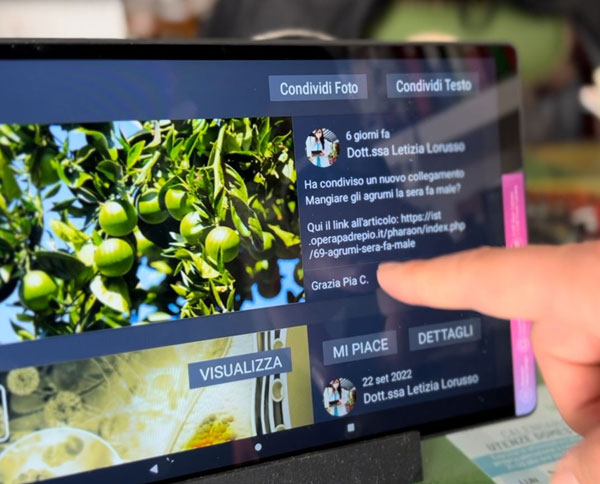
16 Jun Insights from the Pharaon deployment in Italy
The world’s population of people aged 65 years and older is rapidly rising, in the EU more than one fifth (21,1%) was aged 65 and over in 2022. Research is looking into ways to increase the healthy life years of older individuals and their quality of life. Specifically, the Italian pilot of the Pharaon project employs assistive technologies to reduce social isolation and help caregivers in monitoring the health of their loved ones, which in turn should increase physical and mental health of both older adults and informal caregivers.
In March 2023, a meeting with facilitators of the two Italian pilot sites Tuscany and Apulia observed that the monitoring services were more positively evaluated than the socialization services. People using the monitoring services were more enthusiastic and could foresee themselves using the technology in the future. On the other hand, older adults using the socialization service felt stressed about using the technology because they feared doing something wrong when using the system and needed external help. We therefore were interested in comparing the usability and stress derived from the usage of such services and hypothesized that loneliness could affect the stress and confidence towards technology.
Participants completed three questionnaires: the first one assesses the usability of the system, the second evaluates how lonely a person feels, whereas the third one determines the stress that comes from the technology usage. For the usability we also included four specific questions: “I think that I would like to use this system frequently”, “I thought the system was easy to use”, “I think that I would need the support of a technical person to be able to use this system” and “I felt very confident using the system”. These questions would give more insight into the “intention to use”, “easiness of use”, “readiness to use”, and “confidence”, respectively.
We found that indeed people using the monitoring services were more likely to envision themselves using the system in the future. They felt that they did not need help from others and considered the assistive technology easy to use. We also discovered that participants who had higher stress towards technology rated the usability as low, and more specifically felt that they would not use the system frequently, that the system was difficult to use and that they would need help from a technical person because they lacked confidence. However, we did not find that people who felt lonelier had a negative attitude or had more stress towards technology.
From these results we have gathered more important knowledge for the research community. Other than demographic factors, it is important to pay attention to contextual factors that could affect the intention to use technology. Stress towards technology could be a barrier that has the potential to hinder technology acceptance.

